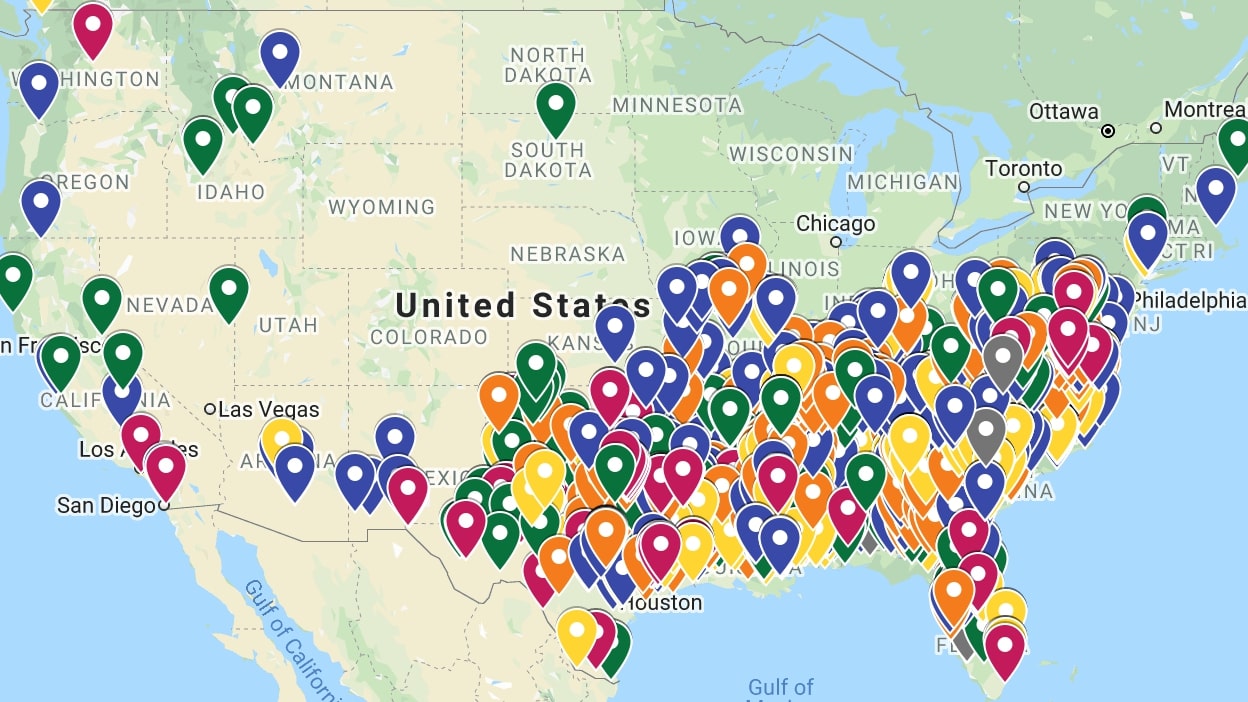Dozens of videos online have been massively popular over the past two weeks showing protesters across the world tearing down monuments to slave owners and genocidal leaders.
As protests against racism and police brutality have grown since the killing of George Floyd, demonstrators have made an effort to deface or destroy statues to Confederacy leaders like Jefferson Davis and Robert E. Lee. In the U.K. last weekend, protesters were seen toppling a statue of a 17th-century slave trader and throwing it into a river, as Forbes reported.
From the U.S. to the U.K., protesters are toppling statues of Confederate soldiers and colonialists, including:
• Christopher Columbus statues
• A Confederate monument
• A statue of a 17th-century slave trader pic.twitter.com/vs4u0QFUgJ— NPR (@NPR) June 11, 2020
The Southern Poverty Law Center (SPLC) has decided to lend a helping hand, releasing an easy-to-use map that helps people figure out all of the Confederate symbols in their own state so efforts can be made to have them removed.
In its 2016 report on Confederate symbols, the center found that 1,747 public commemorative symbols to the losing side of the Civil War still existed, even in northern states.
There was a small but forceful movement to take down some of the most famous Confederate statues in the country after the massacre of Black churchgoers by white supremacist Dylann Roof in 2015.
Roof had several photos showing him with Confederate regalia on social media before he killed nine Black people at a church in Charleston, South Carolina.
While some efforts to remove Confederate plaques and statues were successful, most states and cities took legal measures to protect the statues and stop people from defacing or tearing them down.
The SPLC updated its report in February 2019, adding that 114 Confederate symbols had been removed since the Charleston shooting.
On its website, the organization states plainly why the map was created.
"The Civil War ended 154 years ago. The Confederacy, as former New Orleans Mayor Mitch Landrieu has said, was on the wrong side of humanity. Our public entities should no longer play a role in distorting history by honoring a secessionist government that waged war against the United States to preserve white supremacy and the enslavement of millions of people. … It’s past time for the South – and the rest of the nation – to bury the myth of the Lost Cause once and for all," the website states.
Protesters in the United States have long fought to have monuments to slave owners and leaders of the Confederacy removed from public view.
But repeatedly, governments have stopped efforts to have the statues or plaques taken down, using a variety of defenses ranging from the need to "protect history" to outright defenses of the Confederate cause.
In its report on the issue, the center said its research found 718 Confederate monuments, with more than 300 in Georgia, Virginia and North Carolina alone. There are also at least 100 public K-12 schools and three colleges named after Lee, Davis and other Confederate leaders. The report also notes that 80 counties and cities are named after Confederates generals and politicians.
There are nine observed state holidays in six states as well as 10 U.S. military bases named after Confederate military leaders, according to the SPLC.
The group also created a form that allows people to provide updates to the list of Confederate memorials.
While protesters have made waves by ignoring local legislation to unilaterally remove the statues or plaques, people should be aware that police have in the past arrested Black people for trying to tear down Confederate symbols.
Earlier this week, the proclaimed leader of the Ku Klux Klan's Virginia chapter was arrested for trying to ram his truck into Black Lives Matter protesters approaching a statue of A.P. Hill, an infamous Confederate general, in Richmond.
But the potential violence or arrests haven't stopped protesters from reveling in the current movement to take down racist symbols. Even Speaker of the House Nancy Pelosi has joined in on the movement, calling for the Capitol’s National Statuary Hall Collection to get rid of 11 Confederate statues.
“I’m so happy that I’m alive to see it come down and to see black people take it down — not the city, not your mayor, nobody important. Black people are taking down this hate,” an unidentified Black woman told Norfolk TV station WVEC.

